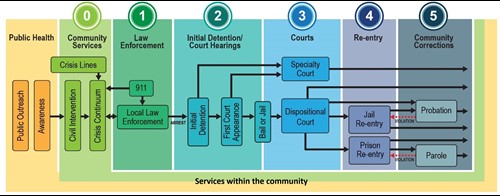SIM Mapping Workshop
Rural Communities: Apply for a SIM Mapping!
The JCMH will provide adult or juvenile SIM Mapping Workshops free of charge to selected rural communities in 2025. There are no fees for registration, tuition, or materials associated with the workshops. The JCMH will cover all costs associated with workshop planning and coordination, facilitator time, analysis, and report development.
A SIM mapping workshop brings a community together to assess available resources, determine gaps in services, and plan for change. “Readiness for change” is a critical element in determining whether a SIM mapping workshop will fit the needs of a community. To determine a community’s readiness for change, the community must self-assess how well its mental health, criminal or juvenile justice systems, and substance use services are integrated. This self-assessment will help the JCMH adjust the workshop to fit each community’s needs.
The Sequential Intercept Model was developed by Mark R. Munetz, M.D. and Patricia A. Griffin, Ph.D., in conjunction with SAMSHA’s GAINS Center. Since its creation, it has been used by communities to assess available resources, determine gaps in services, and plan for change.
A Sequential Intercept Model mapping is a workshop that develops a map illustrating how people with behavioral health needs move through the criminal justice system. The workshop allows participants to identify opportunities for collaboration to address inefficiencies in the justice system.

After the JCMH hosts a workshop, we write a report for the county. The report includes best practices, resources, and gaps and opportunities at each intercept level that were identified during the workshop. It also includes details about the priorities for change that small groups discussed. Finally, we highlight the recommendations that have been developed in response to the workshop discussion and the group's identified priorities and action plans.










